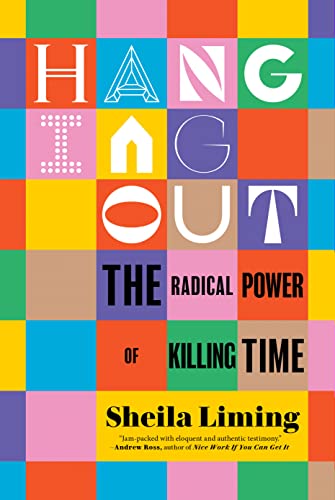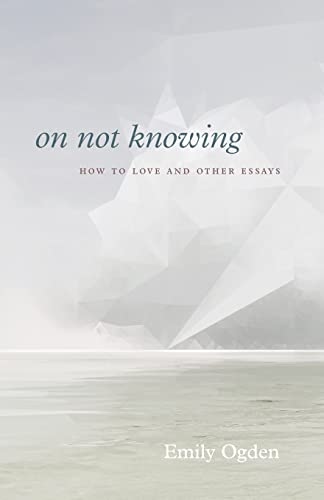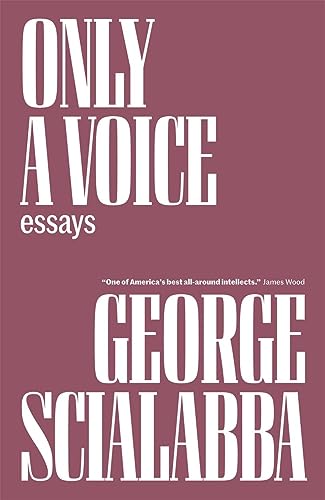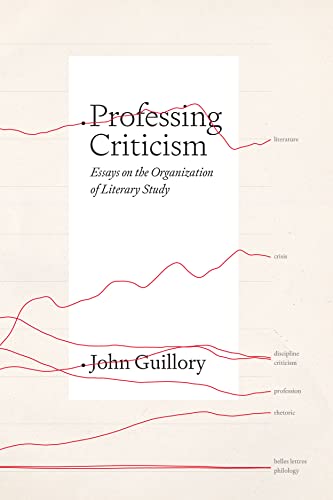Since I became a full-time critic, I have taken care to do what my partner, who has a real job, calls professional development: reading the work of my fellow critics, mostly in magazines, but also when they appear in book form. In 2023, it seemed to me, there was an unusual amount of reflection on the state of contemporary criticism, some of which I participated in myself, arguing in that interpretation should be viewed not only as scholarship, but as an artform in its own right.
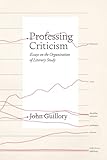 This year, I read John Guillory’s Professing Criticism, which follows the trajectory of literary criticism in England and the United States as it moved from belletristic journalism into the university in the mid-twentieth century. I found myself impressed by Guillory’s suggestion that what we may now be witnessing, as professional scholarship is made economically unviable, is a return of criticism to the institutional status quo ante.
This year, I read John Guillory’s Professing Criticism, which follows the trajectory of literary criticism in England and the United States as it moved from belletristic journalism into the university in the mid-twentieth century. I found myself impressed by Guillory’s suggestion that what we may now be witnessing, as professional scholarship is made economically unviable, is a return of criticism to the institutional status quo ante.
 Only A Voice, a collection of essays from across the storied career of “critic’s critic” George Scialabba, reacquainted me with the work of the figures who flourished in the moment before criticism merged with scholarship—the New York Intellectuals as well as their successors, such as Ellen Willis and Christopher Lasch. Forthright yet charitable in his critique, Scialabba gleans his greatest insights from those he disagrees with and is a model for the practice of independent criticism.
Only A Voice, a collection of essays from across the storied career of “critic’s critic” George Scialabba, reacquainted me with the work of the figures who flourished in the moment before criticism merged with scholarship—the New York Intellectuals as well as their successors, such as Ellen Willis and Christopher Lasch. Forthright yet charitable in his critique, Scialabba gleans his greatest insights from those he disagrees with and is a model for the practice of independent criticism.
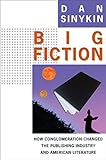 Literary sociology is indispensable for those who wish to understand how the company culture and economic organization of publishing influence the form and content of the novels we read. Dan Sinykin’s Big Fiction is a compelling study of the largely behind-the-scenes effects of conglomeration on the trajectory of American fiction, featuring provocative readings of the careers—alas, now things of the past—of Toni Morrison and Cormac McCarthy.
Literary sociology is indispensable for those who wish to understand how the company culture and economic organization of publishing influence the form and content of the novels we read. Dan Sinykin’s Big Fiction is a compelling study of the largely behind-the-scenes effects of conglomeration on the trajectory of American fiction, featuring provocative readings of the careers—alas, now things of the past—of Toni Morrison and Cormac McCarthy.
 One of the goals of modernism was to erase the distinction between art and life; insofar as criticism is practiced as an artform, this means erasing the distinction between criticism and life. Emily Ogden’s On Not Knowing and Sheila Liming’s Hanging Out are both exemplary in this regard. In a series of seventeen short essays, Ogden, an heir to Elizabeth Hardwick, brings readings of Poe, Emerson, Melville, and Dickinson to bear on the everyday uncanniness of experiences ranging from swimming and giving birth to “eluding one’s captors” and “coming back to life.”
One of the goals of modernism was to erase the distinction between art and life; insofar as criticism is practiced as an artform, this means erasing the distinction between criticism and life. Emily Ogden’s On Not Knowing and Sheila Liming’s Hanging Out are both exemplary in this regard. In a series of seventeen short essays, Ogden, an heir to Elizabeth Hardwick, brings readings of Poe, Emerson, Melville, and Dickinson to bear on the everyday uncanniness of experiences ranging from swimming and giving birth to “eluding one’s captors” and “coming back to life.”
 Similarly, in Hanging Out, form follows function: a paean to the pleasures and political potential that inheres in the varieties of convivial experience, Liming’s readings of Henry Green to M.F.K. Fisher to Tom McCarthy, to name but a few, combine the charm of witty table talk with the heady excitement of a symposium. (Full disclosure: much to my surprise, I found myself a character in Hanging Out. I mention this not to qualify the above judgment in the slightest, but to say that I can personally confirm that Liming practices what she preaches.)
Similarly, in Hanging Out, form follows function: a paean to the pleasures and political potential that inheres in the varieties of convivial experience, Liming’s readings of Henry Green to M.F.K. Fisher to Tom McCarthy, to name but a few, combine the charm of witty table talk with the heady excitement of a symposium. (Full disclosure: much to my surprise, I found myself a character in Hanging Out. I mention this not to qualify the above judgment in the slightest, but to say that I can personally confirm that Liming practices what she preaches.)

 Mindful of all I have left out, I must conclude with what was quite simply the most intellectually stimulating reading experience, in any genre, I had this year: A.V. Marraccini’s We the Parasites. Part critical manifesto, part natural history, part sentimental education, We the Parasites represents a genuine breakthrough in our understanding of what criticism is and how it can be written, answering, at long last, Sontag’s call for an “erotics of art.” It is destined to become a classic and I will not stop talking about it until it does.
Mindful of all I have left out, I must conclude with what was quite simply the most intellectually stimulating reading experience, in any genre, I had this year: A.V. Marraccini’s We the Parasites. Part critical manifesto, part natural history, part sentimental education, We the Parasites represents a genuine breakthrough in our understanding of what criticism is and how it can be written, answering, at long last, Sontag’s call for an “erotics of art.” It is destined to become a classic and I will not stop talking about it until it does.
More from A Year in Reading 2023
A Year in Reading Archives: 2022, 2021, 2020, 2019, 2018, 2017, 2016, 2015, 2014, 2013, 2012, 2011, 2010, 2009, 2008, 2007, 2006, 2005

